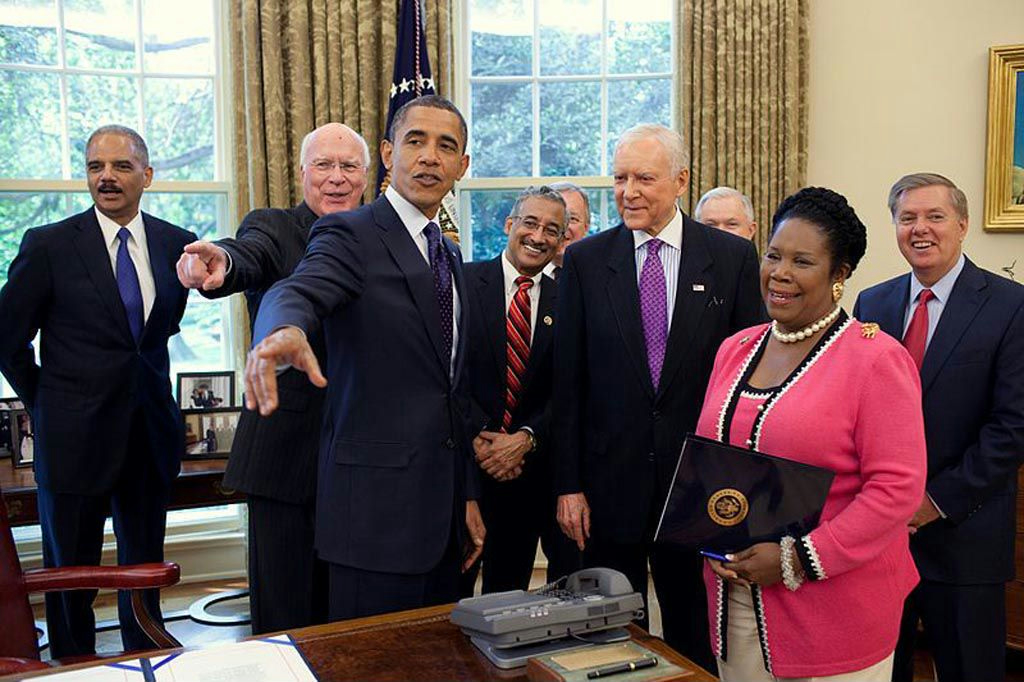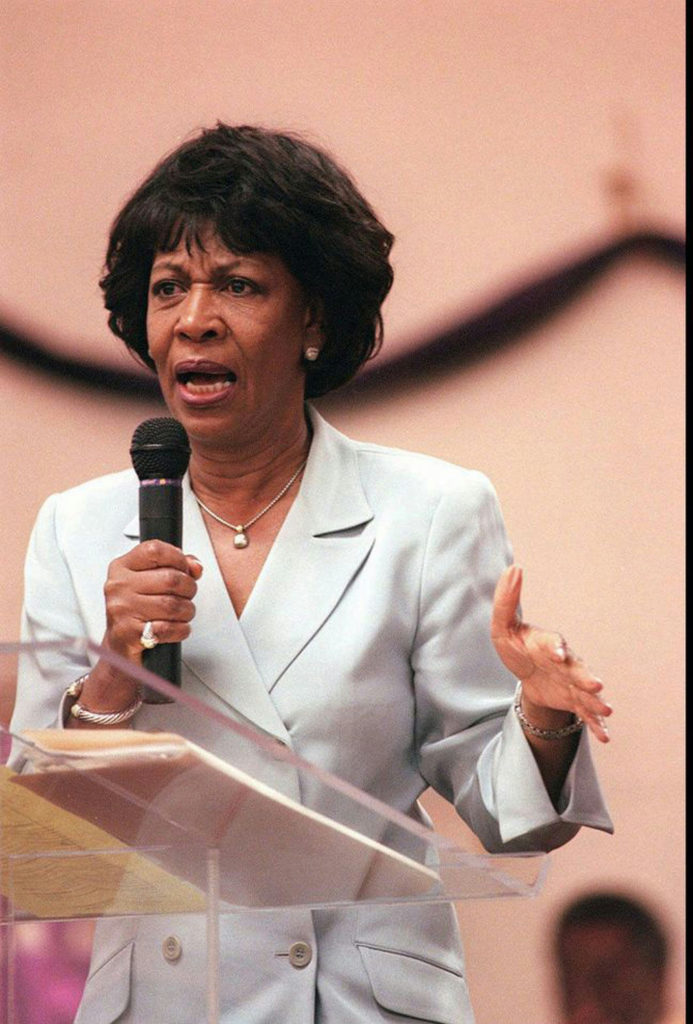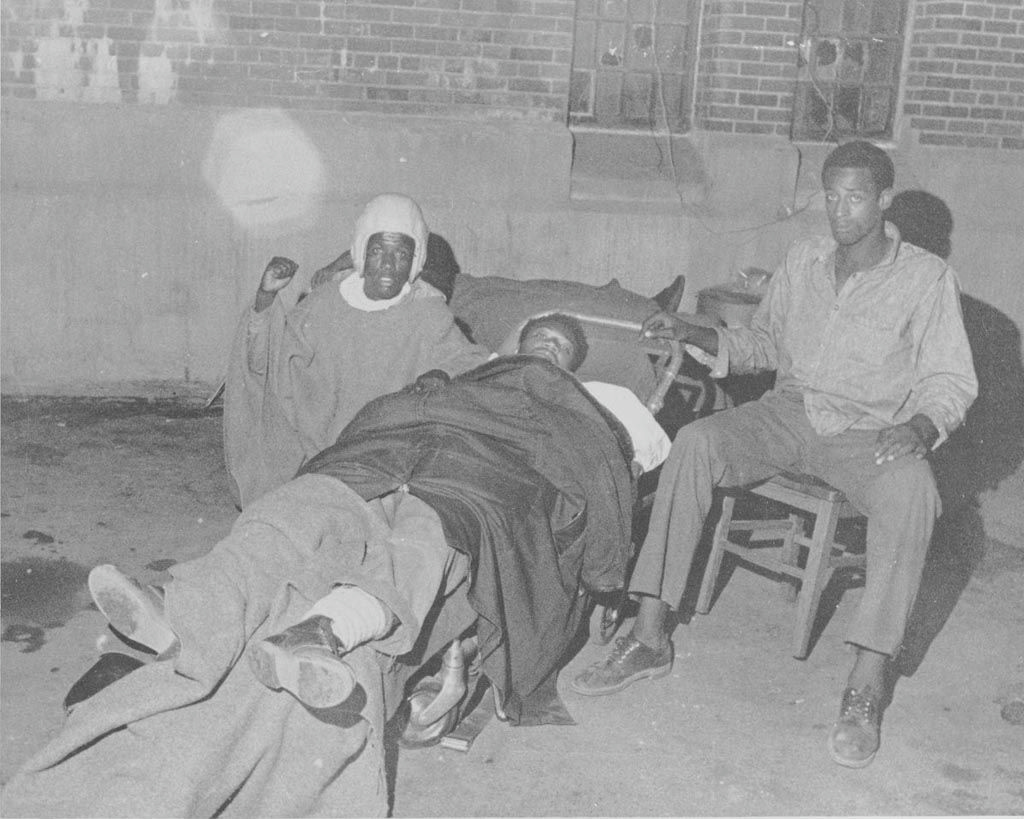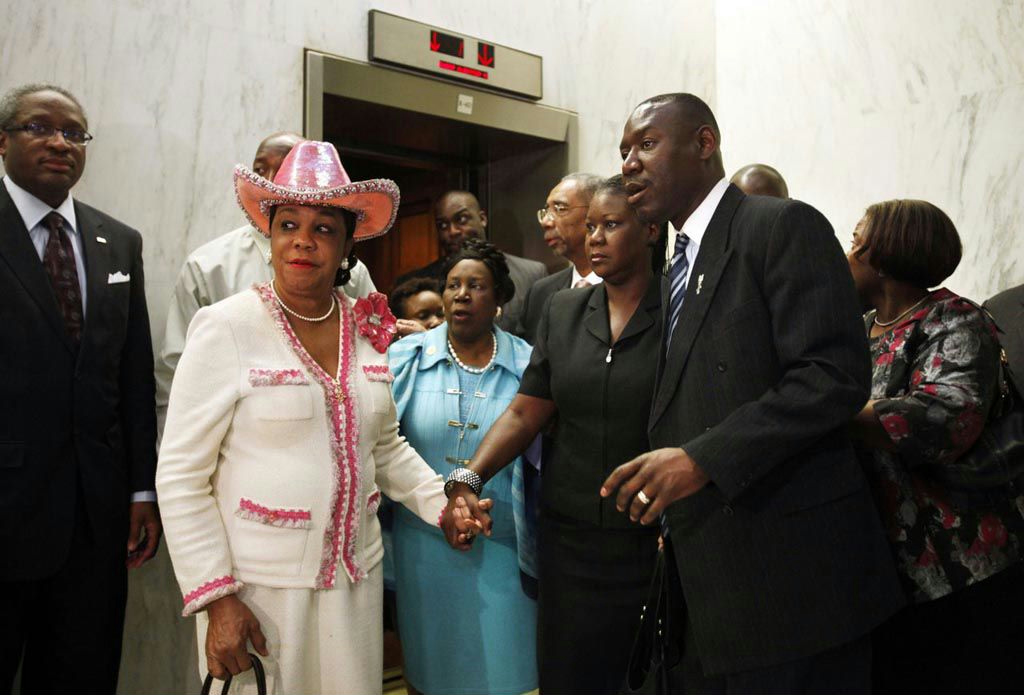Criminal Justice: Legislation
Discover the history of CBC activism on criminal justice issues including police brutality, drug trafficking, sentencing and prison reform.

President Obama Signs the Fair Sentencing Act (2010)
President Barack Obama talks with Members of Congress after signing the Fair Sentencing Act in the Oval Office on August 3, 2010.
The Congressional Black Caucus (CBC) and its members have played an important role in the introduction and debate surrounding criminal justice legislation since the Caucus’ founding in 1971. Legislation supported by the CBC on prison reform, capital punishment, racial profiling, juvenile justice, fair sentencing, and ex-offender rights reflect the CBC’s commitment to ensuring equal treatment of all people under the law.
Reps. Ronald Dellums (D-CA) and John Conyers (D-MI) led the Caucus’ legislative efforts in the 1970s by introducing numerous pieces of legislation to demanded better treatment of American prisoners. Other CBC founding members, Reps. Augustus Hawkins (D-CA), Louis Stokes (D-OH), Shirley Chisholm (D-NY), Parren Mitchell (D-MD), Charles Rangel (D-NY), and Del. Walter Fauntroy (D-DC) supported their efforts. Together, between 1971 and 1973, Reps. Dellums and Conyers introduced and co-sponsored legislation which sought, among other things, to establish minimum standards for treatment of prisoners, create a Commission on Penal Reform, a Criminal Justice Reform Administration, and increase assistance to correctional programs. Between 1972 and 1979, Rep. Dellums introduced and subsequently re-introduced the Omnibus Penal Reform Act to offer a comprehensive approach to prison reform. While the bill never became law, it set a tone for the conversations in Congress and signaled the CBC’s commitment to this issue. It also opened the door for later pieces of legislation on women’s rights in prison. This issue was especially important to many women of the CBC, from Reps. Yvonne Braithwaite Burke (D-CA), Shirley Chisholm (D-NY), and Barbara Jordan (D-TX) in the Caucus’ fledging years, to more recent CBC women like Rep. Maxine Waters (D-CA) who have been active on the issue. Rep. Waters’ Protection of Women in Prison Act in 1999 was one of several pieces of legislation introduced by CBC members requiring improved prison conditions and facilities for women.
The CBC has been vocal in addressing death penalty legislation for many years. In 1989, Rep. Conyers introduced the Racial Justice Act. The act sought to allow death row inmates to appeal their capital sentences based on statistics showing racial disparities in how courts ruled in death penalty cases. This legislation was reintroduced several times in Congress, including as part of an early version of 1994 Violent Crime Control and Law Enforcement Act, but did not pass the Committee stages. However, its introduction shed light on the many cases of racially disproportionate sentencing, which would later be revisited by CBC members in other legislative efforts.
One such form was through a series of legislation on Racial Profiling in the early 2000s. Del. Eleanor Holmes-Norton (D-DC) was especially vocal on this issue, introducing both the Racial Profiling Prohibition Act of 2001, and later in 2004, leading a charge for a Racial Profiling Ban. Her primary focus in these bills was the disproportionate numbers of vehicles being stopped by police based on the driver’s race. Del. Norton continued legislative efforts on the issue into the 2010s. Rep. Conyers introduced a similar piece of legislation called the End Racial Profiling Act, which expanded the scope beyond traffic stops to include racial profiling by police in “frisks, questioning searches, and seizures.” First introduced in 2001, Rep. Conyers re-introduce this legislation over the years, including just before he left office in 2017. After Rep. Conyers left Congress, Rep. Sheila Jackson Lee (D-TX) took over sponsorship of the bill. More recently, Rep. Karen Bass sponsored and numerous CBC members supported the George Floyd Justice in Policing Act of 2020 (reintroduced in 2021) which included provisions banning racial profiling among its comprehensive reforms.
On matters related to juvenile justice, Rep. Robert C. “Bobby” Scott (D-VA) has been a major proponent in recent history, but the commitment of Black members of Congress to the issue can be traced back to the 1960s. In 1967, Rep. Hawkins introduced a bill to address juvenile delinquency and assist in the prevention, treatment, and control of the problem. In 1969, Rep. Conyers introduced a bill to establish the Institute for Continuing Studies in Juvenile Justice. By the 1970s, other founding members of the CBC joined in the effort, co-sponsoring legislation to establish juvenile research institutes and by 1974, sponsoring the Juvenile Delinquency Act. In 2007, Rep. Scott first introduced the Youth PROMISE (Prison Reduction through Opportunities, Mentoring, Intervention, Support, and Education) Act to amend the 1974 Juvenile Delinquency Act to engage communities in the development of effective prevention and intervention programs to decrease juvenile delinquency and gang involvement.
Another central legislative issue addressed by CBC members is fair sentencing, especially as it relates to the disproportionate impact of the sentencing disparity between crack cocaine and powder cocaine offenses on the Black community. Sentencing laws put into place during the War on Drugs required the same sentence for a person convicted of possessing 500 grams of powder cocaine as someone convicted of possessing 5 grams of crack cocaine, a ratio of 100:1, and mandated a minimum five-year sentence for crack cocaine offenses. This disparity disproportionately impacted Black communities where crack cocaine often was more prevalent. Rep. Rangel first introduced legislation to address the disparity in 1993 with the Crack-Cocaine Equitable Sentencing Act and subsequently reintroduced the bill in each new Congress through 2009. Other CBC members such as Reps. Floyd Flake (D-NY), Maxine Waters (D-CA), and Donald M. Payne (D-NJ), also introduced legislation to address the disparity during this period. The effort was successful in 2010 when the Fair Sentencing Act introduced by Rep. Robert C. “Bobby” Scott (D-VA) was signed into law by President Barack Obama. The Fair Sentencing Act reduced the sentencing disparity from 100:1 to 18:1 and ended the mandatory five-year prison sentence for possession of crack cocaine. CBC members continued work to eliminate the remaining sentencing disparity. Rep. Hakeem Jeffries (D-NY) and Sen. Cory Brooker (D-NJ) introduced the Eliminating a Quantifiably Unjust Application of the Law (EQUAL) Act in 2023 and similar legislation in the prior several Congress to eliminate the disparity entirely and have the change applied retroactively so those already convicted in crack cocaine cases can apply for resentencing.
While much of the CBC’s support of criminal justice legislation has focused on ensuring rights for persons either facing incarceration or currently incarcerated, the CBC has also recognized the importance of protecting the rights of formerly incarcerated persons who are committed to re-entering society in a productive way. As early as 1973, members of the CBC, including Reps. Barbara Jordan (D-TX), Shirley Chisholm (D-NY), John Conyers (D-MI), Ronald Dellums (D-CA), Charles Diggs Jr. (D-MI), and Charles Rangel (D-NY), co-sponsored legislation that sought to amend the Voting Rights Act of 1970 to prohibit states from denying former criminal offenders the right to vote. To date, because of the tireless efforts of CBC members, there have been significant improvements in the policies most deeply affecting ex-offenders. The Second Chance Act, which was introduced by Rep. Danny K. Davis (D-IL) and officially signed into law in 2008, marked a significant victory for those committed to reducing recidivism. The act offered viable options and support for former criminal offenders reentering society. More recent legislative efforts impacting formerly incarcerated individuals include the Clean Slate Act of 2021 introduced by Rep. Lisa Blunt Rochester (D-DE) which would grant qualifying Americans the ability to have eligible criminal records automatically expunged.
CBC members responded to the national outcry for police reform during the 2010s and 2020s with an increase in legislative attempts to ensure equal and humane treatment of all in the justice system. Bills introduced by CBC members included the Eric Garner Excessive Force Prevention Act, the George Floyd Justice in Policing Act, the Police Accountability Act, and the Supporting Black Lives Matter Act. The CBC included many provisions from these bills in its Jobs and Justice Act. First introduced in 2018 by then-CBC Chair Rep. Cedric Richmond (D-LA) and then reintroduced in 2020 by Rep. Karen Bass (D-CA) when she assumed the role of CBC chair, the omnibus bill included over 200 pieces of legislation championed by CBC members and addressed criminal justice reform alongside a wide range of other issues impacting Black Americans.
Black members of Congresses realized a historic legislative victory in 2022 when the Emmett Till Antilynching Act became law. The law made lynching a federal hate crime and increased prison sentences for hate crimes that result in serious bodily injury or death. Rep. George Henry White (R-NC), one of the nation’s few Black Americans elected to Congress before the turn of the 20th century, first proposed legislation to make lynching a federal crime in 1900. Attempts to pass similar legislation in the century afterwards were unsuccessful. Rep. Bobby Rush (D-IL) and Sens. Kamala Harris (D-CA), Cory Booker (D-NJ), and Tim Scott (R-SC) took up the effort in 2019 with the introduction of the Emmitt Till Antilynching Act in the House and the Justice for Victims of Lynching Act in the Senate. After Rep. Rush reintroduced the House bill in 2021, it passed both chambers and was signed into law by President Joseph R. Biden on March 29, 2022.
Today, Black members of Congress continue to introduce legislation to reform the criminal justice system. Congressional Black Caucus members often take the lead in legislative negotiations and use their collective power to direct policy discussions. Through their work, they strive to ensure all Americans receive equal and humane treatment under the law.



